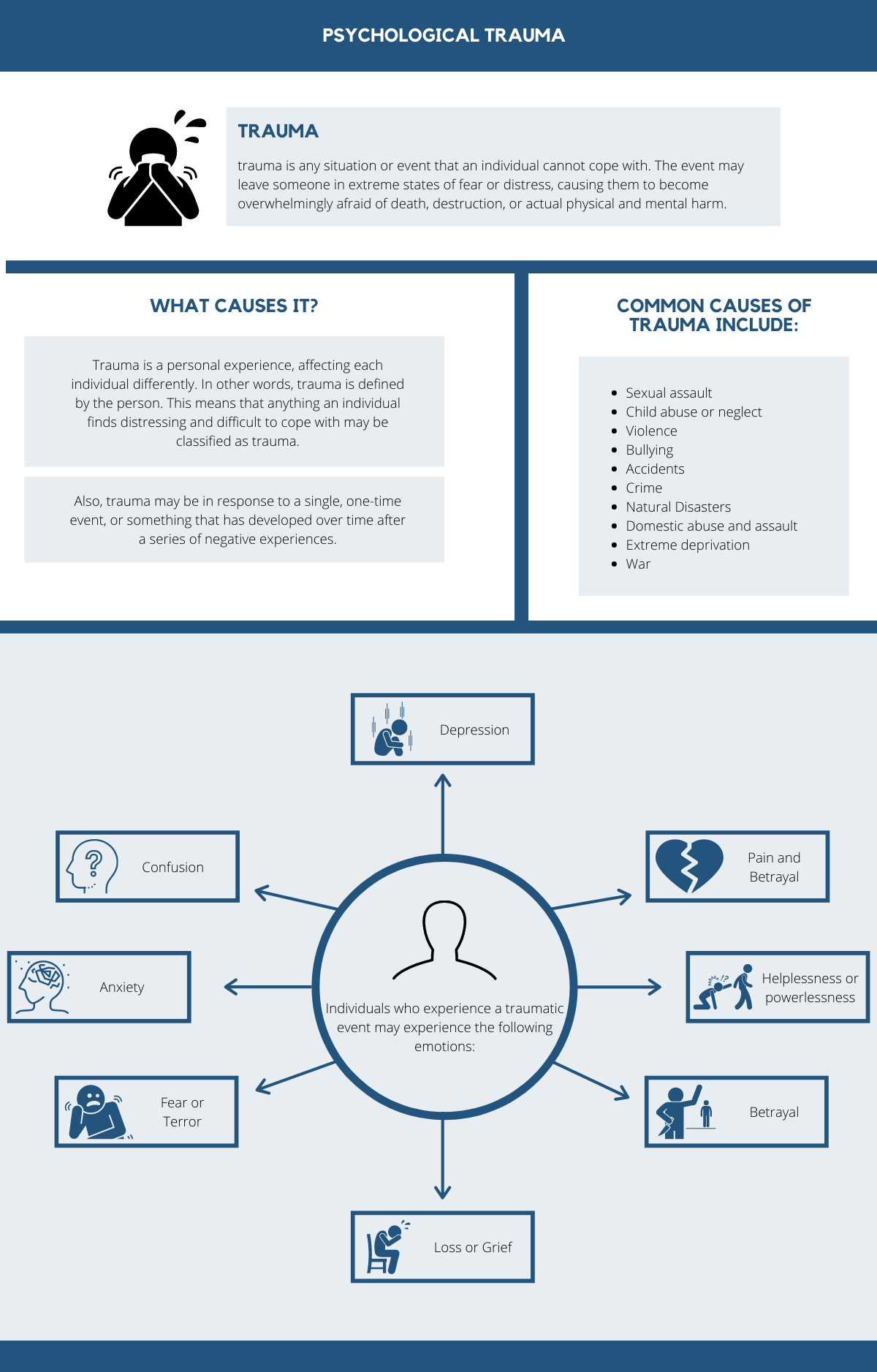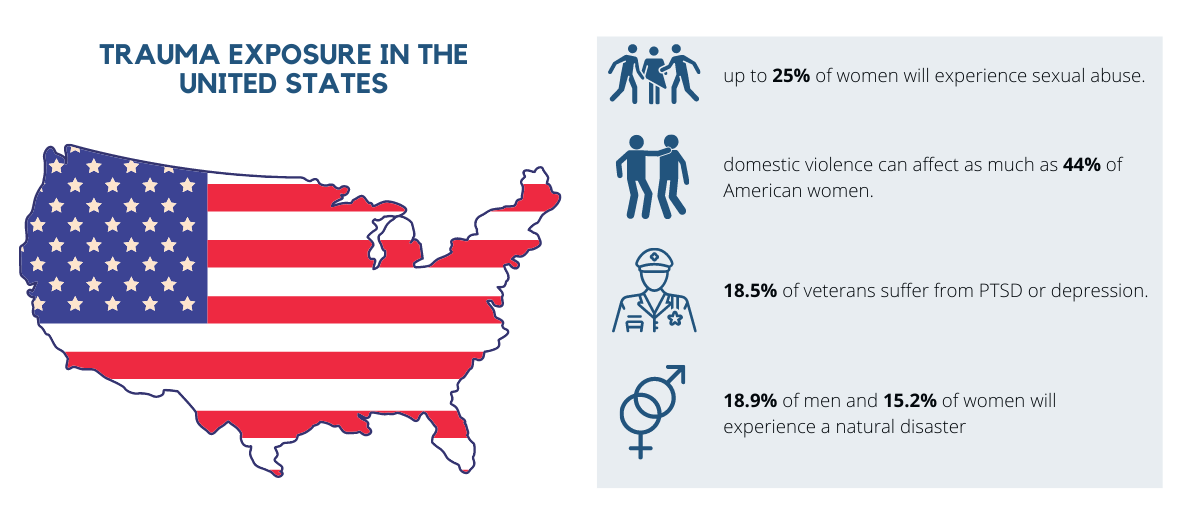Psychological trauma is most simply defined as an individual enduring an extremely distressing event. Oftentimes, traumatic events lead to the development of secondary mental and physical ailments. When left unresolved, these experiences may cause long-term and serious consequences of their trauma, including the development of post-traumatic stress disorder (PTSD) and addiction.
Addiction is a progressive disease that may be caused by a variety of factors, including an individual’s genetics, environment, and life experiences. One of the main causes of addiction has been identified as untreated psychological trauma. The relationship between trauma and addiction is complex, yet closely intertwined. In other words, the negative consequences of both conditions may worsen the symptoms of the other. To effectively recover, individuals suffering from trauma-related PTSD and addiction require treatment guided by a professional.
What is Psychological Trauma?
To put it simply, trauma is any situation or event that an individual cannot cope with. The event may leave someone in extreme states of fear or distress, causing them to become overwhelmingly afraid of death, destruction, or actual physical and mental harm.
Individuals who experience a traumatic event may experience the following emotions:
- Anxiety
- Depression
- Helplessness or powerlessness
- Confusion
- Betrayal
- Pain
- Entrapment
- Loss or grief
- Fear or terror
Oftentimes, these emotions are temporary. However, individuals who have suffered a significantly tragic event may develop post-traumatic stress disorder (PTSD). The symptoms of PTSD may appear at any time after experiencing a traumatic event. When left untreated, PTSD symptoms may last for years or even a lifetime.
What Causes Trauma?

Trauma is a personal experience, affecting each individual differently. In other words, trauma is defined by the person. This means that anything an individual finds distressing and difficult to cope with may be classified as trauma. Also, trauma may be in response to a single, one-time event, or something that has developed over time after a series of negative experiences.
Common causes of trauma include:
- Sexual assault
- Child abuse or neglect
- Violence
- Bullying
- Accidents
- Crime
- Natural disasters
- Domestic abuse and assault
- Extreme deprivation
- War
Lastly, it is important to note that individuals who witness a distressing event may develop trauma as well. If you or a loved one have recently dealt with a traumatic experience, it may be time to consult with a mental health professional.
How Prevalent is Exposure to Trauma?
Unfortunately, experiencing trauma is highly common in today’s society. Let’s take a look at recent statistics on trauma exposure in the United States:

- up to 25% of women will experience sexual abuse.[1]
- domestic violence can affect as much as 44% of American women.[2]
- 18.5% of veterans suffer from PTSD or depression.[3]
- 18.9% of men and 15.2% of women will experience a natural disaster.[4]
According to the National Center for PTSD, about 60% of men and 50% of women experience at least one traumatic event in their lives.[5]
Also, almost three-fourths of individuals receiving treatment for substance abuse have a history of exposure to psychological trauma. With that being said, it is clear to see that there is a strong link between trauma and addiction to alcohol or drugs.
The Connection Between Trauma and Addiction
The relationship between trauma, PTSD, and drug or alcohol addiction is undeniable. While trauma may provoke substance abuse, drug and alcohol abuse can make people more likely to endure trauma. Whatever the case may be, these two conditions only make one another worse.
Trauma Causing Substance Abuse
Individuals experiencing trauma are at a greater risk of abusing and becoming addicted to drugs or alcohol. Oftentimes, dealing with the emotions and side-effects related to psychological trauma and PTSD becomes too difficult. As a result, the individual may turn to drugs or alcohol to soothe their emotions or symptoms, leading to the development of dependency.
Unfortunately, the symptoms of PTSD make it difficult for individuals to stop abusing substances. This is because any reminders of the traumatic event may cause the individual to become triggered, leading to self-medication and the perpetuation of addiction.
Substance Abuse Causing Trauma
Conversely, drug and alcohol addiction may cause an individual to become exposed to trauma. This happens when an individual engages in risky or impulsive behavior while under the influence.
For example, substance abuse may cause trauma due to risky behaviors such as:
- Driving under the influence
- Fighting while incapacitated by substances
- Placing yourself in dangerous situations
- Unsafe sexual behavior
- Increased risk-taking
- Self-harm
While trauma is never the fault of the victim, engaging in risky behavior may increase the likeliness of traumatic events occurring. Unfortunately, many individuals who are addicted to substances and experience trauma begin to increase their drug or alcohol intake as a means of self-medication. Obviously, self-medication through the use of drugs and alcohol will only make things worse in the long-run. If you or a loved one suffer from trauma, PTSD, and addiction, it may be time to attend dual-diagnosis addiction treatment.
Dual Diagnosis Treatment for Trauma-Induced PTSD and Addiction
Individuals suffering from co-occurring disorders such as PTSD and addiction should attend a dual diagnosis treatment facility. During this form of treatment, patients will be given the tools and support needed to recover from both (or all) mental health conditions they suffer from. If you or a loved one require dual diagnosis treatment, New Jersey Interventions is here to help you get started.
Are you having a difficult time finding a dual diagnosis treatment center in your area? Are you unsure of how to find treatment for trauma and addiction? Contact New Jersey Interventions to speak with an addiction specialist who can help you find the right addiction treatment center for you.
References-
- https://www.nsvrc.org/statistics
- https://www.domesticshelters.org/articles/statistics/domestic-violence-statistics
- https://www.ptsd.va.gov/understand/common/common_veterans.asp
- https://www.samhsa.gov/trauma-violence
- https://www.ptsd.va.gov/understand/common/common_adults.asp#:~:text=Going%20through%20trauma%20is%20not%20rare.%20About%206,combat%2C%20disaster%2C%20or%20to%20witness%20death%20or%20injury.
Medically Reviewed: October 2, 2020

All of the information on this page has been reviewed and verified by a certified addiction professional.

